The experiences and views of each site’s users – from how much political content they see to the platforms’ impact on democracy
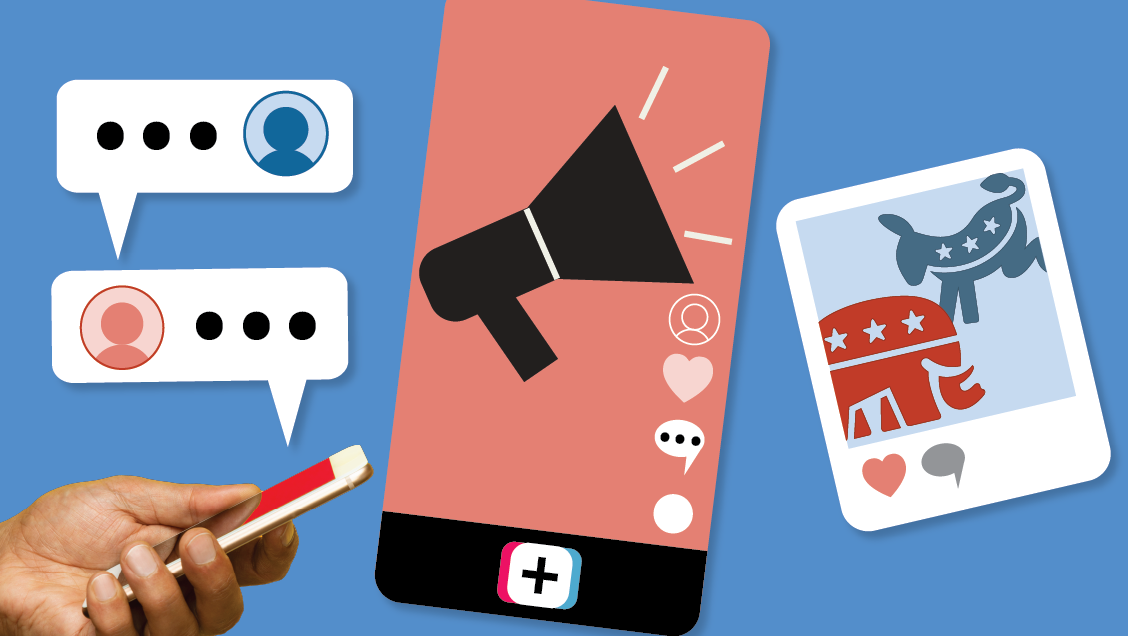
The Pew-Knight Initiative supports new research on how Americans absorb civic information, form beliefs and identities, and engage in their communities.
Pew Research Center is a nonpartisan, nonadvocacy fact tank that informs the public about the issues, attitudes and trends shaping the world. Knight Foundation is a social investor committed to supporting informed and engaged communities. Learn more >
Pew Research Center conducted this study to understand how TikTok users, X (formerly Twitter) users, Instagram users and Facebook users experience politics on these platforms. For this analysis, we surveyed 10,287 adult internet users in the United States from March 18 to 24, 2024.
Everyone who took part in the survey is a member of the Center’s American Trends Panel (ATP), an online survey panel that is recruited through national, random sampling of residential addresses. This way, nearly all U.S. adults have a chance of selection. The survey was weighted by combining the sample of internet users with data from ATP members who do not use the internet, and weighting the combined dataset to be representative of all U.S. adults by gender, race, ethnicity, partisan affiliation, education and other categories. The analysis in this report is based on those who use the platforms of interest. Refer to the survey methodology for details. Read more about the ATP’s methodology.
Here are the questions used for this report, along with responses, and the survey methodology.
This is a Pew Research Center report from the Pew-Knight Initiative, a research program funded jointly by The Pew Charitable Trusts and the John S. and James L. Knight Foundation. Find related reports online at https://www.pewresearch.org/pew-knight/.
Social media platforms are often at the center of the nation’s political debates – from free speech and harassment to the fate of democracy itself. Companies’ decisions about who and what to allow on their platforms have taken on even more weight ahead of the 2024 U.S. presidential election.
Results from a Pew Research Center survey conducted in March 2024 shed new light on this environment. Americans’ experiences with politics on social media often depend on the platforms they use, from TikTok and X to Facebook and Instagram.
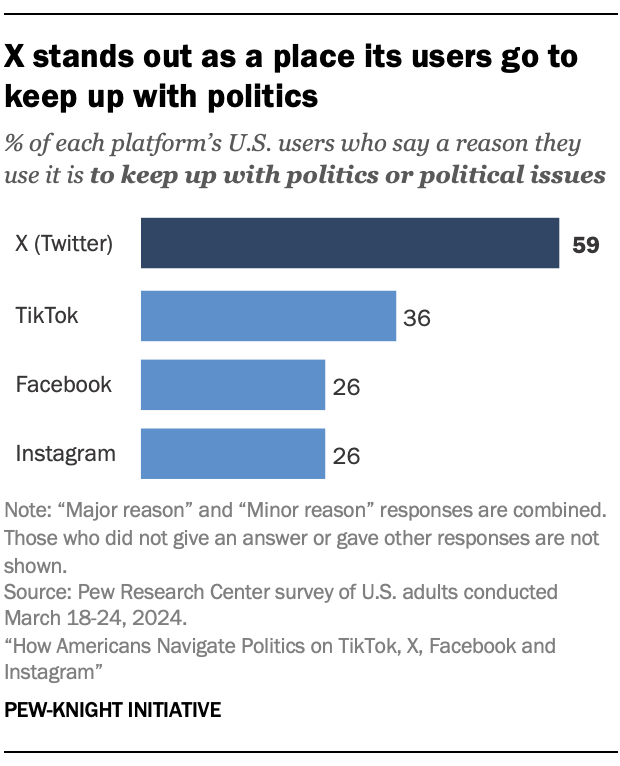
X stands out as a place people turn to for politics. A majority of X users (59%) say keeping up with politics or political issues is a reason they use it, compared with 36% of TikTok users and even smaller shares of Facebook or Instagram users (26% each).
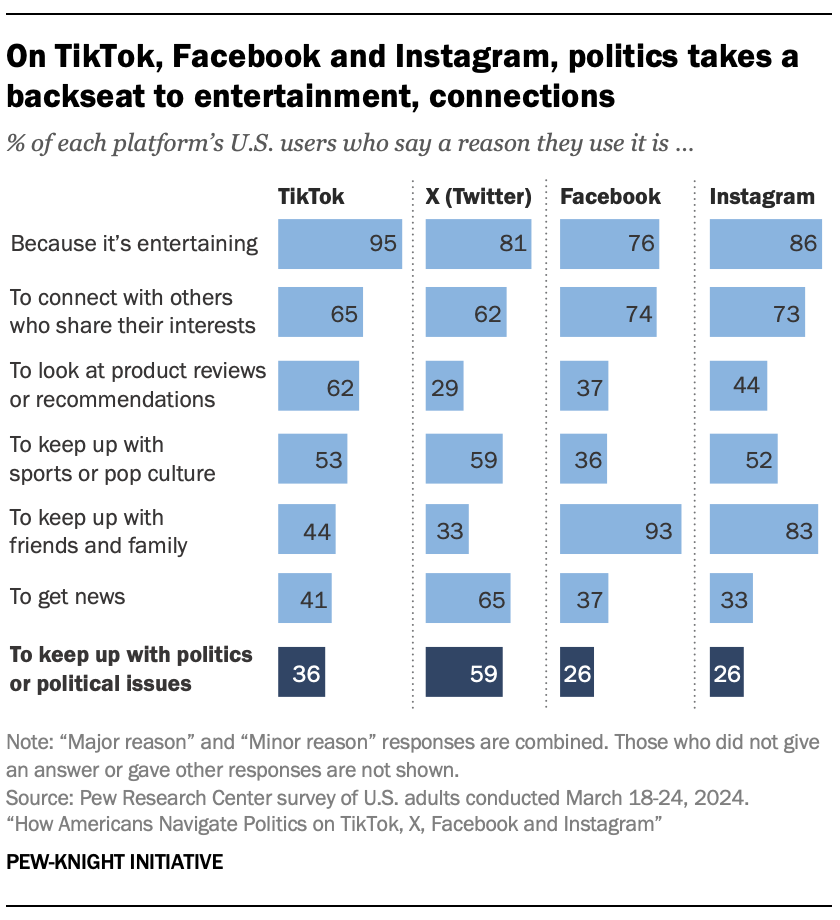
There’s a range of reasons people are drawn to social media platforms – even on X, where using it to keep up with politics is relatively common. On TikTok, Facebook and Instagram, politics takes a backseat to other reasons we explored.
For example:
- Entertainment largely reigns, especially on TikTok. Nearly all TikTok users (95%) say they’re on it because it’s entertaining, and about three-quarters or more say the same for X, Facebook and Instagram.
- On Facebook and Instagram, friends and family are motivators. Most Facebook and Instagram users say a reason for using each is to keep up with friends and family. This share drops to 44% for TikTok and 33% for X.
Related: How Americans Get News on TikTok, X, Facebook and Instagram
Still, people are coming across political posts as they scroll through social media. And companies’ policies shape the political environment people enter when they log on.
Our survey of 10,287 U.S. adult internet users, conducted March 18-24, 2024, set out to explore what this looks like on TikTok, X, Facebook and Instagram today.
Jump to the following sections to learn more about how experiences and views differ across these four platforms:
And for a deep dive on one platform at a time, go to the chapter covering its users’ views and experiences:
This is one of two Pew Research Center reports on habits and attitudes on different social media platforms from the Pew-Knight Initiative, a research program funded jointly by The Pew Charitable Trusts and the John S. and James L. Knight Foundation.
Social media and democracy
The relationship between social media and elections has often been rocky. In 2016, platforms struggled to stop the spread of election misinformation. After 2020, they grappled with decisions to ban former President Donald Trump.
Not everyone is convinced platforms are a dire threat to democracy. But as experts warn misinformation could worsen in 2024 and the Supreme Court tackles cases defining free speech on social media, the question persists: Are these platforms good for democracy?
We’ve asked this question about X (formerly Twitter) before – once in 2021, before Elon Musk took over the platform and revamped it, and again in 2023.
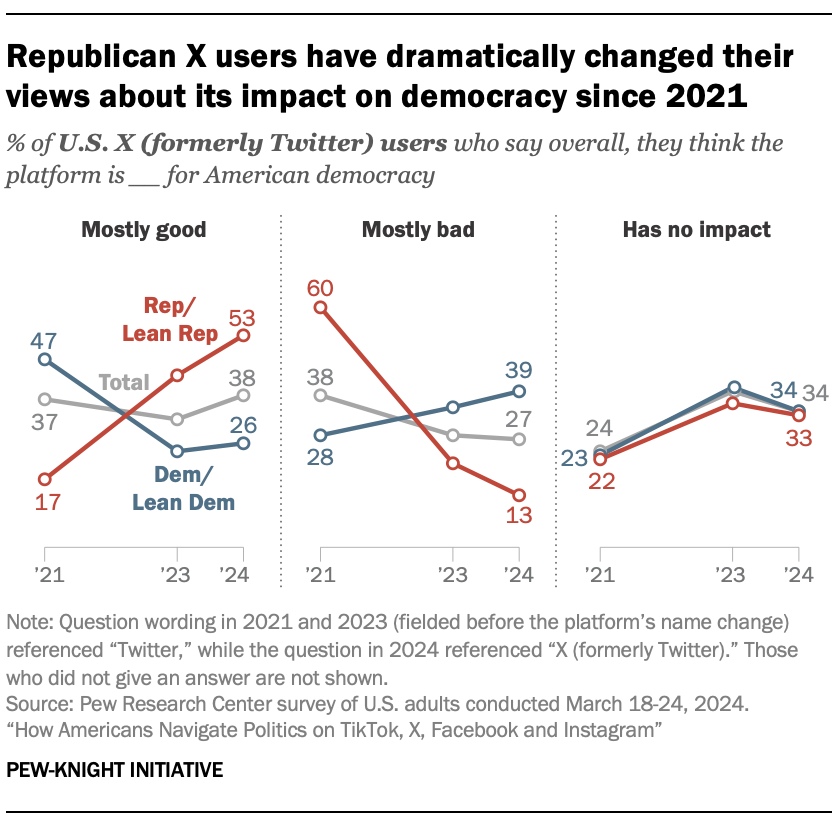
Today, views of X are more positive than negative. About four-in-ten X users (38%) say it’s mostly good for democracy, 27% say it’s mostly bad, and 34% say it has no impact. That’s an uptick of 6 percentage points in the share who say it’s mostly good from last year.
GOP users’ views of X have changed dramatically in the past three years. The share of Republican users who see X as mostly good for democracy has roughly tripled from 17% in 2021 to 53% today. This includes a 10-point rise in just the past year (from 43% to 53%). (Throughout this report, Democratic and Republican users include independents who lean toward each party.)
Democratic X users’ views are trending negative. The share of Democratic users who see it as mostly bad for democracy has risen 11 points since 2021, to 39% today.
Partisans hold opposing views of X. Republican X users are far more likely than Democratic users to see it as mostly good for democracy (53% vs. 26%). In contrast, Democratic users are three times as likely as their GOP counterparts to see it as mostly bad (39% vs. 13%).
For the first time, we asked this question about Facebook, Instagram and TikTok. We found that not everyone thinks these platforms play a role in the democratic process.
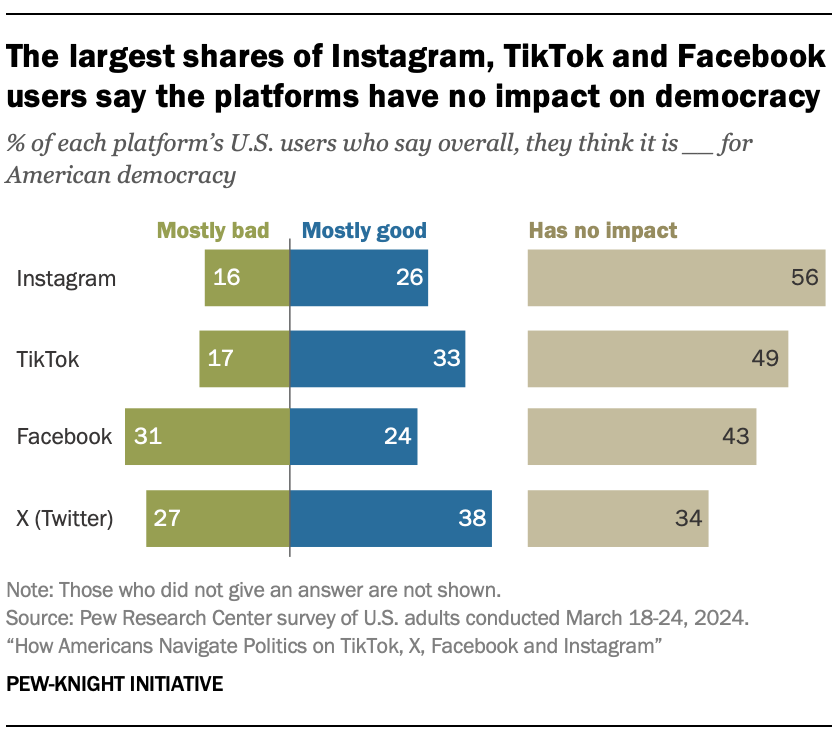
For Instagram, TikTok and Facebook, the most common view is that each has no impact on democracy. Over half of Instagram users say so, as do 49% of TikTok users and 43% of Facebook users.
Otherwise, views of TikTok and Instagram are more positive than negative. A third of TikTok users say it’s mostly good, versus 17% who say it’s mostly bad.
Similarly, 26% of Instagram users say it’s mostly good, compared with 16% who say it’s mostly bad.
On the other hand, views of Facebook are more negative than positive: 31% of Facebook users think it’s mostly bad, while 24% say it’s mostly good. But the largest share (43%) says it has no impact.
Seeing and sharing politics
X is the only platform where a majority of users cite politics as a reason they use it. But people on TikTok, Facebook and Instagram still come across political content.

How much political content do people see – and share?
Like with reasons for use, X leads in how much politics its users see. Most X users (74%) say at least some of what they see on it is about politics or political issues. Smaller shares of users say the same for Facebook (52%), TikTok (45%) and Instagram (36%).
People are far more likely to see politics than share about it. Just 14% of X users say at least some of what they post or share on it is about politics or political issues. About one-in-ten Facebook, TikTok and Instagram users say the same..
On each platform, Republicans and Democrats are similarly likely to see at least some political content there – and that’s also true for sharing it. For example, identical shares of Republican and Democratic TikTok users (47% each) see at least some political content there. (Refer to the Appendix for these shares for all four platforms.)
Which way does political content on platforms lean?
Accusations of political bias and censorship on platforms have been widespread in recent years, both in the news and among the general public. But what do users of these platforms think about the content they see?
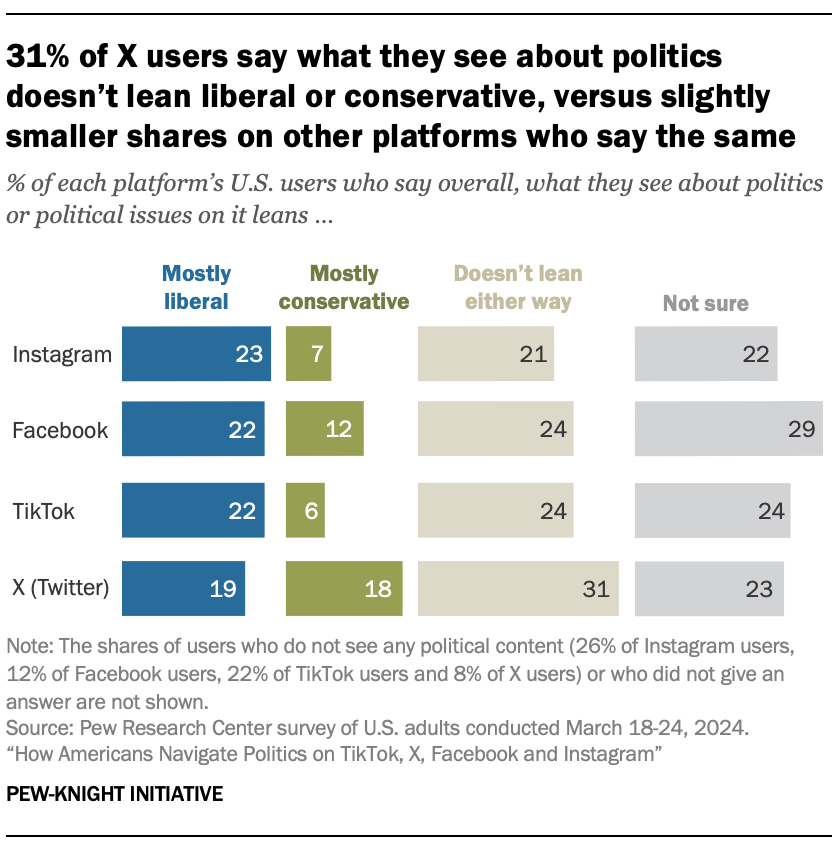
Across all four platforms we studied, some users don’t see a clear lean to one side in the content they consume. About four-in-ten or more say that what they see about politics doesn’t lean toward a particular ideology or that they are unsure. For example, 53% of Facebook users say what they see doesn’t lean either way (24%) or that they are unsure (29%).
Still, Instagram, Facebook and TikTok users are more likely to say what they see is mostly liberal than mostly conservative. About a quarter on each platform say what they see is mostly liberal. Smaller shares perceive a conservative lean.
X users are about evenly split between thinking what they see leans liberal (19%) versus conservative (18%). Another 31% say it doesn’t lean either way.
Differences by party
Party differences depend on which platform we’re looking at. For example, Republicans who use Facebook are more likely than Democrats to say the political content they come across there is mostly liberal (29% vs. 16%). Their Democratic counterparts are slightly more likely to say the content is mostly conservative (16% vs. 10%).
On the other hand, on X, Republicans are more likely than Democrats to say what they see doesn’t lean either way (37% vs. 26%). But Democratic users are somewhat more likely than Republican users to say what they see there leans liberal (22% vs. 16%).
There are also slight party differences on Instagram and TikTok (refer to the back chapters for more).
Why people do – or don’t – post about politics
To understand more about what motivates people to post (or not), we followed up with two groups of users.
Why people post about politics
We asked users who say they post at least a little political content on these platforms about four reasons why they might do so.
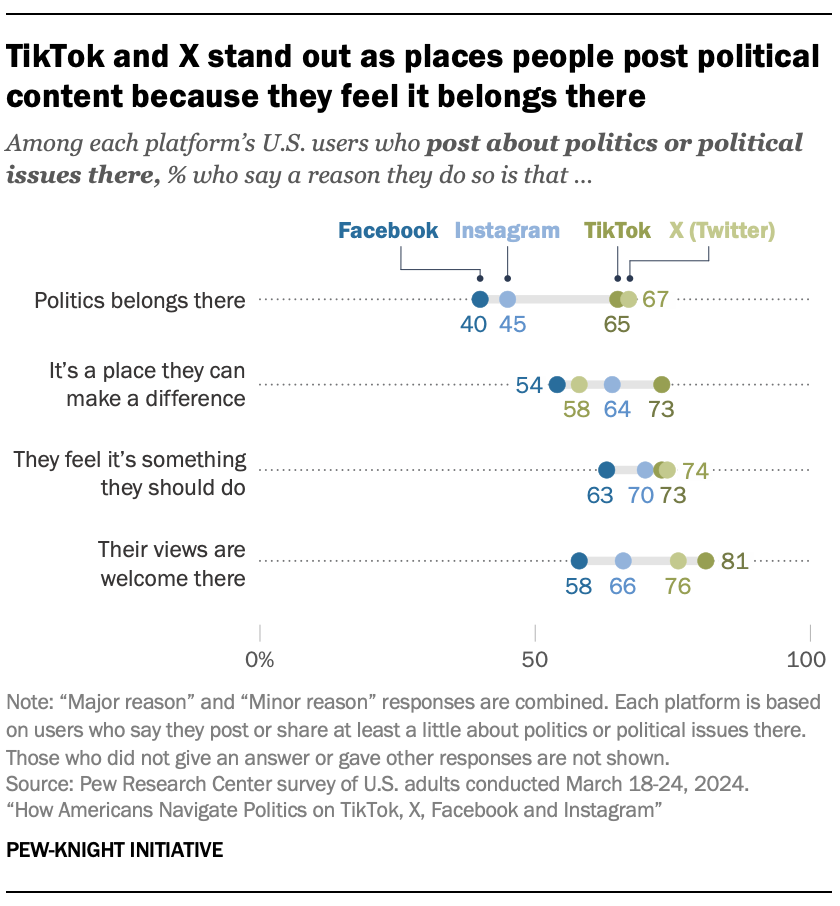
Politics belonging there: About two-thirds of those who share things about politics on TikTok or X say a reason why is that politics belongs there. Far fewer on Instagram (45%) or Facebook (40%) say this.
Making a difference: About three-quarters of users who post political content on TikTok (73%) say it’s because this is a place they can make a difference. By comparison, smaller shares post political content on X (58%) or Facebook (54%) for this reason. (The share who say this about Instagram – 64% – is statistically similar to both TikTok and X.)
Feeling obligated: Roughly three-quarters of those who post about politics on X or TikTok say feeling it’s something they should do is a reason why they do so, along with a similar share of their peers on Instagram (70%). Among Facebook users who share politics there, 63% cite this as a reason.
A welcoming environment: Most TikTok and X users who post about politics also say their views feeling welcome there is a reason they do so – higher than the shares on the other platforms.
Differences by party
For some platforms, we were also able to explore how these reasons might vary by party. For example, on X, Republican users who post about politics are more likely than their Democratic counterparts to cite their views being welcome there as a major reason why they do so (54% vs. 33%).
Conversely, on Facebook, Republicans who post about politics are less likely than their Democratic peers to cite a welcoming environment as a major reason they post about politics (12% vs. 20%).
Why people steer clear of posting about politics
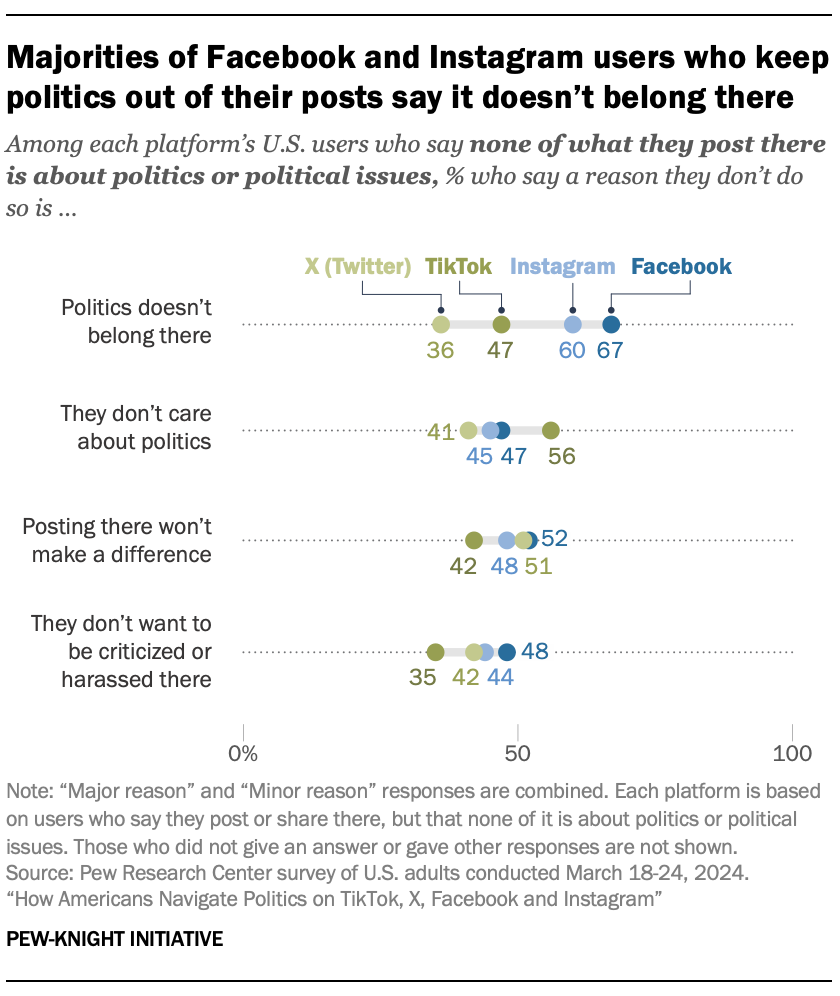
We also asked users who say they post on the platforms, but never about politics or political issues, about four reasons why they might avoid doing so.
Politics not belonging there: A majority of Facebook (67%) and Instagram (60%) users who keep politics out of their posts say it’s because politics doesn’t belong there. Smaller shares say the same for TikTok (47%) or X (36%).
The threat of harassment: Similar shares of Facebook (48%) and Instagram (44%) users who avoid posting politics say it’s because they don’t want to be criticized or harassed there. A smaller share of their counterparts on TikTok (35%) say the same. (The share who says this about X doesn’t statistically differ from the other platforms.)
To learn about those who don’t care or don’t think it’ll make a difference, and for more on how reasons rank within a platform, refer to the back chapters on TikTok, X, Facebook and Instagram.
Differences by party
Again, we were able to explore how these reasons differed by party for some platforms. For example, on Facebook, Republicans who avoid posting about politics are slightly more likely than Democrats to say politics not belonging there is a major reason they don’t post this (49% vs. 42%).
There is a similar pattern for Instagram: 44% of Republicans versus 36% of Democrats say a major reason they avoid this is because politics doesn’t belong there.
Free speech and harassment
Social media platforms’ decisions about what content to allow can be consequential. Elon Musk has declared X a place for free speech, but some say its policies have the opposite effect. Meta has moved to limit political content on its platforms, including Facebook and Instagram. And TikTok has come under fire for alleged censorship, including by those posting about #BlackLivesMatter.
We wanted to hear from each platform’s user base: Do platforms feel like places for open political expression?
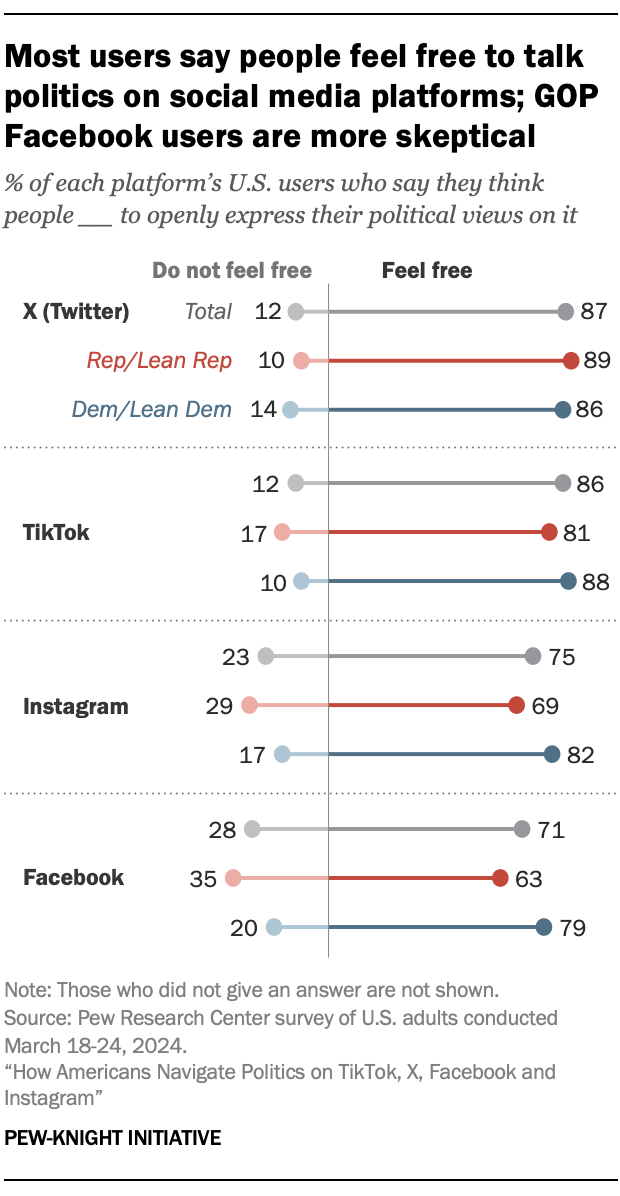
Most users think people feel free to express political views on these platforms. About nine-in-ten X users and a similar share of TikTok users think so. Three-quarters of Instagram users and 71% of Facebook users say the same.
Majorities of users across the political aisle say this, but Republican users are less likely than Democrats to think people feel free to talk about politics on Facebook, Instagram and TikTok. For example, they are more skeptical about free expression on Facebook: 35% of Republican Facebook users think people do not feel free to express political views there, compared with 20% of Democrats.
However, similar shares across parties see X as a place for free expression. About nine-in-ten Republican users think people there feel free to express political views, and roughly the same share of Democratic users say so.
Harassment
With open expression can come anger and abuse. Our previous work shows that while online harassment occurs in a wide range of places from gaming to dating apps, it most often occurs on social media sites. And a rising share of Americans have been harassed online because of their political beliefs.
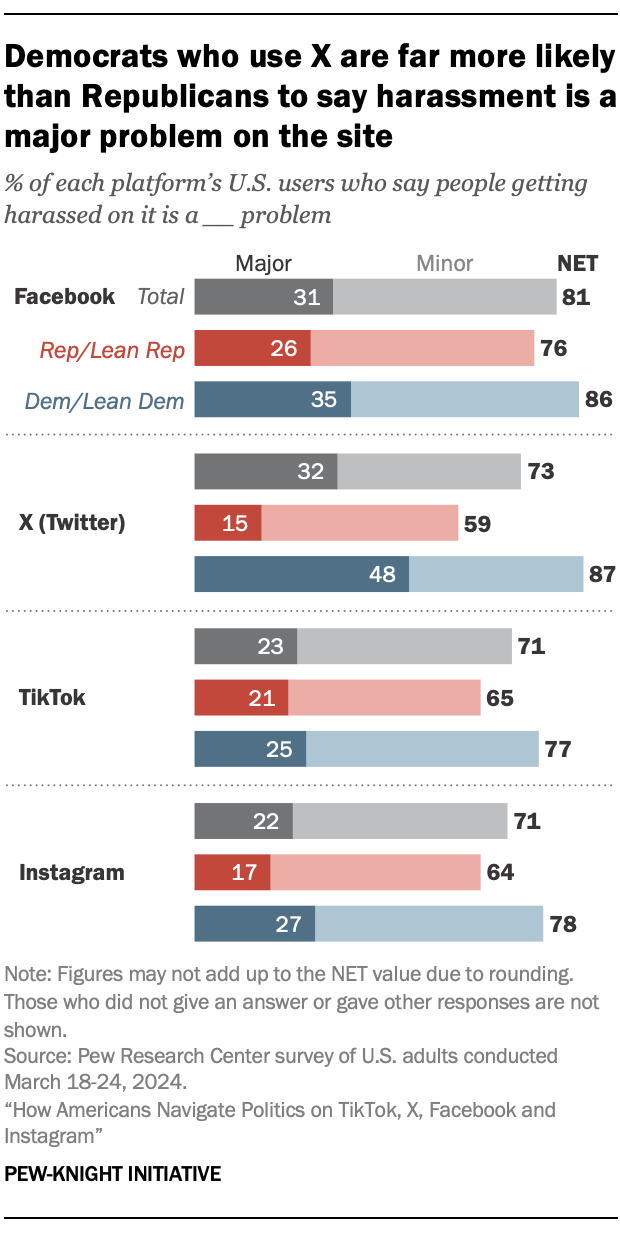
Harassment is widely seen as a problem on each of these sites. Roughly eight-in-ten Facebook users say this is a problem there, including 31% who say it’s a major one.
Smaller shares of X, TikTok and Instagram users – though still about seven-in-ten – see harassment as a problem on these sites.
The extent to which people think harassment is a problem differs by party, especially on X. Democratic users are about three times as likely as Republican users to say harassment is a major problem (48% vs. 15%).
Partisan differences are more modest for other sites. For example, 35% of Democrats who use Facebook see harassment as a major issue on the site, compared with 26% of Republican users.




